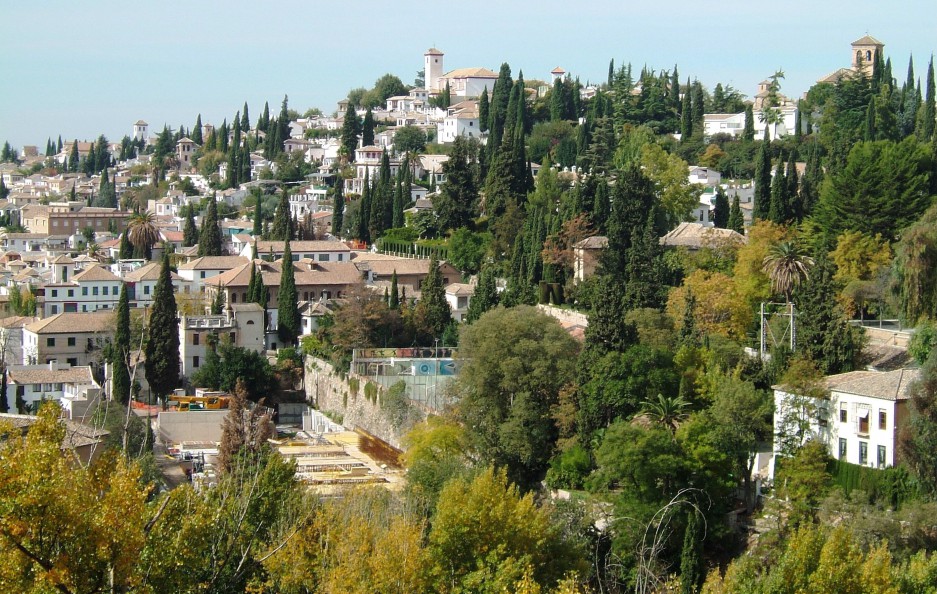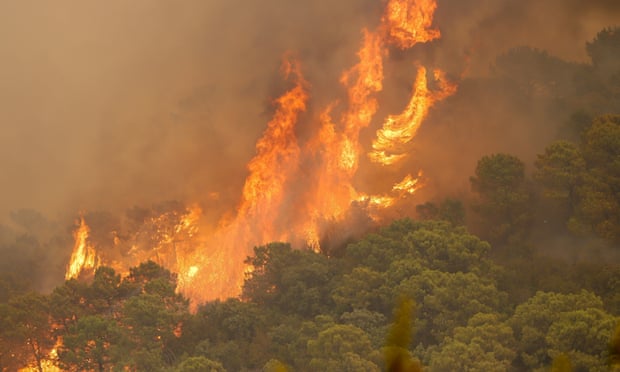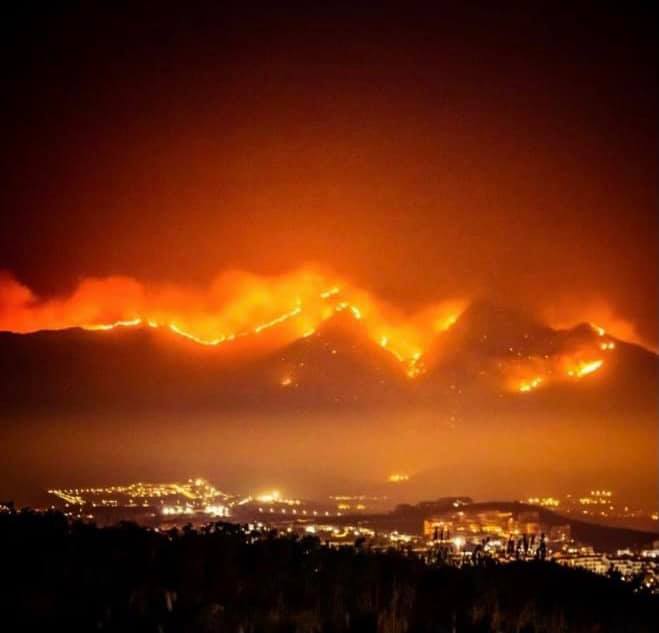At last rain has fallen on southern Spain and brought the terrible forest fire that was devouring the Sierra Bermeja under control. It had been raging for almost a week despite the efforts of a thousand firefighters, aided by the military. One firefighter was killed. It destroyed 7,800 hectares of protected zones and caused about 1,600 people from several villages to be evacuated from their homes.
One of those villages was Jubrique, a village with which I feel a personal connection, having spent two weeks there in August 1990, closely involved with the local community. The fire affecting Jubrique has been headline news in Spain for the last few days and even made the British media but prior to that, it remained almost unknown outside Málaga province: a small village of a few hundred inhabitants (1,000 at the time of my stay but now much reduced as younger people have left to work on the coast). It lies north of Estepona in the Serranía de Ronda, a typical mountain village with whitewashed houses, tree-shaded squares, narrow alleys and strong local traditions.
I remember the verdant countryside of chestnut trees, fragrant pines, the rare pinsapo fir, cork oaks, olive and fruit trees; the clean sparkling rivers with oleanders lining their banks and deep pools perfect for swimming; the eagles and other raptors circling overhead, bee-eaters winging past, a flash of vivid colour; the limestone crags standing out prominent against a deep blue sky. How much now survives of that landscape, of the thickly wooded Genal valley where Jubrique is situated? Cork trees take nine years to regrow the cork, how many years to plant new trees and wait for them to grow? The chestnut harvest in Jubrique yielded 300 tons, with similar quantities in each of the ten surrounding villages working together as a cooperative.
I was in the village as a guest of the Benamonarda cooperative, an initiative set up in the late 1980s by Chantal and Peter, a Belgian-English couple. They had searched for a suitable village in the area, one where the inhabitants were keen to become involved as members of the cooperative. Their aim was to promote direct contact between visitors and inhabitants, introducing tourists to local crafts, agriculture and the environment by integrating them in the way of life on a small scale and so helping to sustain and improve the local infrastructure.
There was no tourist accommodation in Jubrique at that time, no tourists except for those visiting through the cooperative – never more than twenty at a time and usually far fewer so as not to swamp the village. I stayed in the home of Isabel and her family, one of seven families who offered lodgings and some meals. Like many of her generation, Isabel was deprived of an education by the Civil War and ensuing poverty, and remained illiterate. No newspapers or magazines were available in the village. Its inhabitants received their news more quickly and easily via television. When a letter arrived for Isabel, she asked me to read it to her. A government programme to promote literacy was attracting more women than men, we were told. The men preferred the bar to the classroom, machismo being still very prevalent.
Jubrique had twenty shops – most of them unsigned and undetectable behind their bead curtains – and thirty bars where the walls were decorated with religious pictures of saints and virgins interspersed with nude pin-ups. At one of the two village discotecas, we danced with a multi-generational crowd of villagers. I was struck by the mixing of children, teenagers, parents and grandparents, all enjoying themselves together in a way unheard of in the UK at that time. The village silver band played every Saturday in the Plaza; every child was offered the opportunity to learn an instrument.
Chico took us to his farm and led us on a mule trek through the chestnut forests to the neighbouring village of Genalguacín; on another occasion he took us on a walk up the Genal river, negotiating slippery rocks and boulders or fighting our way through tangled vegetation on the banks. We visited Providencia’s finca 4km outside Jubrique, where we had a go at milking goats and watched her making goats’ cheese. At the esparto workshop we learnt about the traditional craft of esparto weaving. We explored the Pileta caves, Ronda, Bobastro and the gorge of El Chorro, scrambled over the limestone rock formations of El Torcal with views across to Morocco, took part in an all-night fiesta in Algotocín. As a guest in Jubrique, I learnt more about rural life in an Andalucian village than from all my previous visits to Andalucía as a tourist and all the books I’d read, all my Spanish lessons in England. The experience is still vivid in my memory after thirty years, more than twenty of them living in Andalucía.
The population now, as in so many rural villages, consists of mainly older people who have spent all their lives there. The effect on them of seeing their cherished forests and farms in flames and of having to flee their homes to reach safety must be devastating. So much destroyed in a fire almost certainly started deliberately. I think of Isabel (if she is still alive) and Chico with his farm and his passionate care for the environment, of Domingo whose enthusiasm for preserving the local crafts was transmitted to the younger generation. How they must be weeping now.





